The 12 best Brad Pitt movies
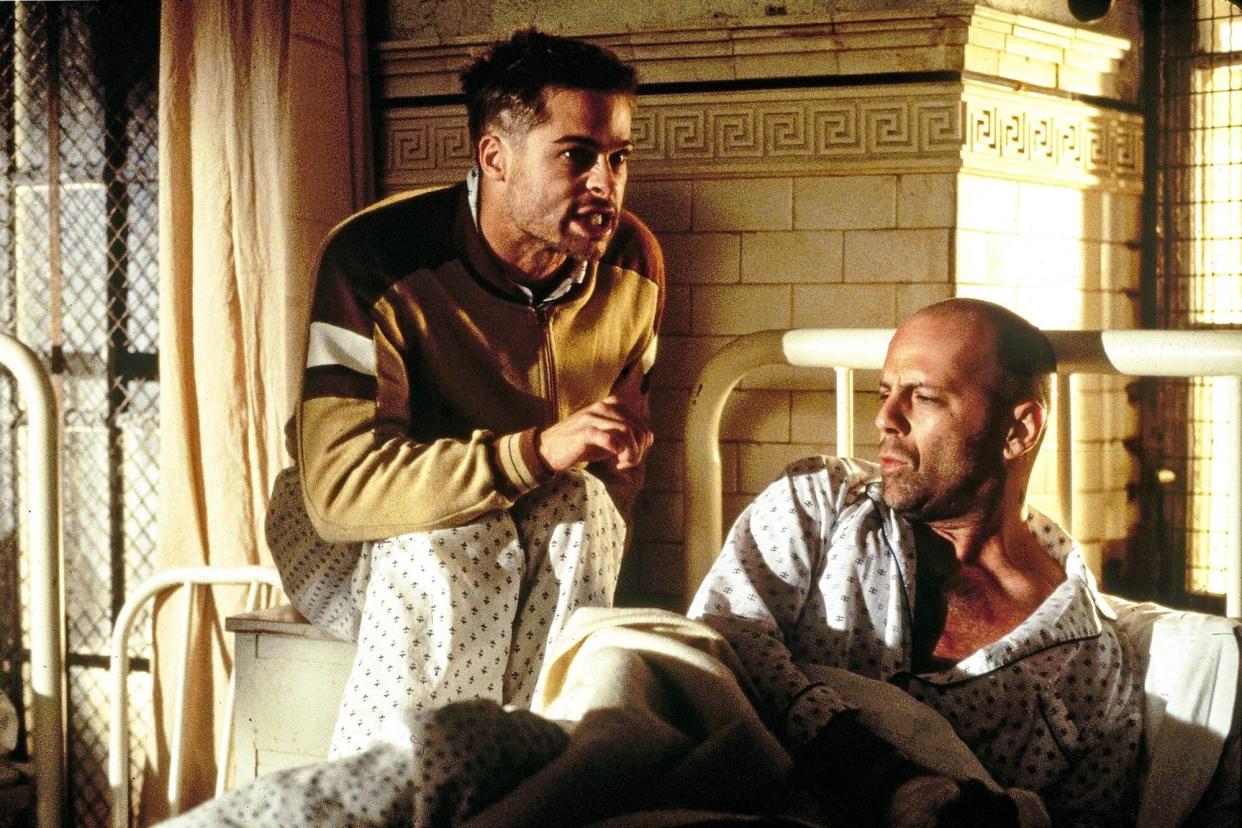
- Oops!Something went wrong.Please try again later.
Nearly 20 million people and counting have watched the first trailer for the highly anticipated new Brad Pitt thriller, Bullet Train, in theaters August 5. The film — based on the book Maria Beetle by Japanese author Kōtarō Isaka — follows an ensemble cast of "eclectic, diverse assassins — all with connected yet conflicting objectives" on a train ride through Japan.
In the trailer, Pitt and famed Puerto Rican musician Bad Bunny tumble through a glass door before an all-out battle ensues. "Dude, I don't even know you!" Pitt quips as he's violently tossed across a bar.
Equipped with a bucket hat, thick-rimmed glasses, and a pistol, 58-year-old Pitt is stepping into a new world of international execution. Fans worldwide are excited to see the David Leitch-directed flick, and if the striking visuals, fight choreography, and clever writing present in the trailer are any indication, this may be another offbeat entry into Pitt's vast, riveting filmography.
Over the past 30 years, Pitt has packed a punch in a variety of roles. In some performances, as an underground fighter in both Snatch and Fight Club, he's done so quite literally. But movie fans have fallen in love with Pitt for a variety of roles: as a baseball manager, a stuntman, a wacky personal trainer, a detective, and countless other characters.
So here, in no particular order, is our list of the best Brad Pitt movies.
<i>12 Monkeys</i> (1995)
Brad Pitt earned his first Academy Award nomination for his supporting role in Terry Gilliam's science-fiction time-travel thriller 12 Monkeys. While he lost the Oscar, Pitt did take home his first Golden Globe. Teaming up with co-star Bruce Willis, Pitt plays Jeffrey Goines, an unpredictable, ranting psychiatric patient in a dystopian facility who happens to be the son of the world's premiere virologist-turned-aggressive social activist. The throughline of the film is unsettling in light of the COVID-19 pandemic, where Willis' character, prisoner James Cole, traverses time to gather more information about the onset of a viral outbreak which killed billions.
In 12 Monkeys, a young Pitt delivers a performance with varying degrees of composure and totally erratic behavior, exposing his bare bottom and tearing pillows as he remains unfazed by demented actions, such as Willis swallowing a spider alive. More details about Goines' motivations are revealed as Cole jumps between timelines. As Pitt's character evolves, so does his mission. Once released from the psychiatric center, Goines embodies his misunderstood-rich-kid-activist mentality, taking underground action to protest animal testing — like letting snakes loose on the Senate floor — while eloquently pontificating as he turns his back on his father's wealth and legacy. It isn't until the final act that the audience can truly understand Goines' scope of involvement in the catastrophic outbreak.

<i>A River Runs Through It (1992)</i>
A River Runs Through It, the 1992 drama directed by Robert Redford, was nominated for a slew of Oscars and even took one home for Best Cinematography. In the novella-inspired, Montana-set film, Pitt plays Paul Maclean, the son of a reverend and younger brother of academic Norman Maclean (Craig Sheffer). The movie is a beautiful slice-of-life vignette, complete with a story of family, companionship, love, and loss. Paul Maclean, a young journalist and beloved son, just can't seem to keep his hands off the bottle. As his alcoholism bleeds into his everyday life, his older brother is helpless as he observes the dangerous scenarios his little brother habitually thrusts himself into. Pitt's character is successful, but is all too familiar with fist-fights and jail cells.
But there is one place Paul Maclean finds his inner peace: fly fishing on Missoula waters. With rod in hand, Maclean's line moves through the air and current like a ballet dancer pirouetting across stage. Indulging their family pastime, the Macleans find reprieve from their troubles and tragedies while knee-deep in the Blackfoot River. A cautionary tale about manhood and one's place in the world, A River Runs Through It showcases Pitt's early acting chops — no chic mystique or explosions necessary.
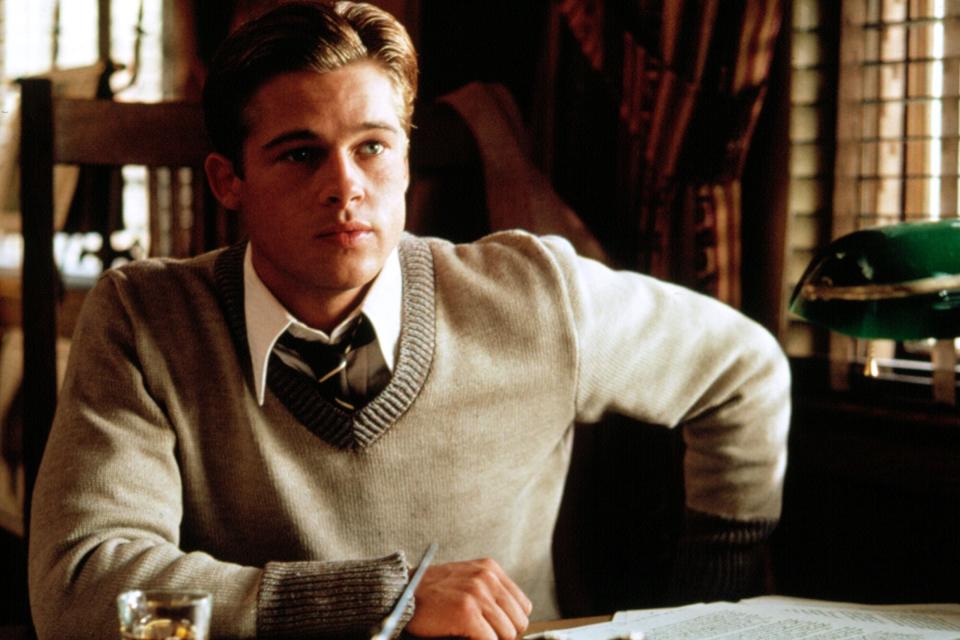
<i>Fight Club</i> (1999)
Based on Chuck Palahaniuk's 1996 novel of the same name, David Fincher's Fight Club is arguably Pitt's most iconic and recognizable work, as the character of Tyler Durden has transcended film into the general cultural consciousness as a symbol of anti-capitalist-establishment enlightened masculinity. Celebrated by some as gospel and criticized by others as pseudo-intellectual, the split-personality meanderings of Pitt and his counterpart —played by the incredible Edward Norton— have endured the test of time and are quoted in the vein of films like The Godfather or Scarface. Remember, "The things you own, end up owning you."
As Tyler Durden, Pitt struts with a cigarette in mouth, rocking his sunglasses and trademark jackets: both leather and fur. The hyper-macho, wildly sexual, bare-knuckle-brawler (alongside Helena Bonham Carter) perfectly juxtaposes Norton's buttoned-up, Ikea catalogue-loving worker bee mentality. As the two explore the curious nature of their relationship, the violent underground fighting ring which brought them together, and the anarchist plans of "Project Mayhem," Pitt delivers one unforgettable scene after the next.
Whether it's the reveal of Fight Club and the reciting of its rules, "making soap," or explaining the "illusion of safety," the amalgamation of moments cements that Durden may long be held as Pitt's most beloved role. It's regrettable that the film only received an Oscar nod for Best Sound Editing.
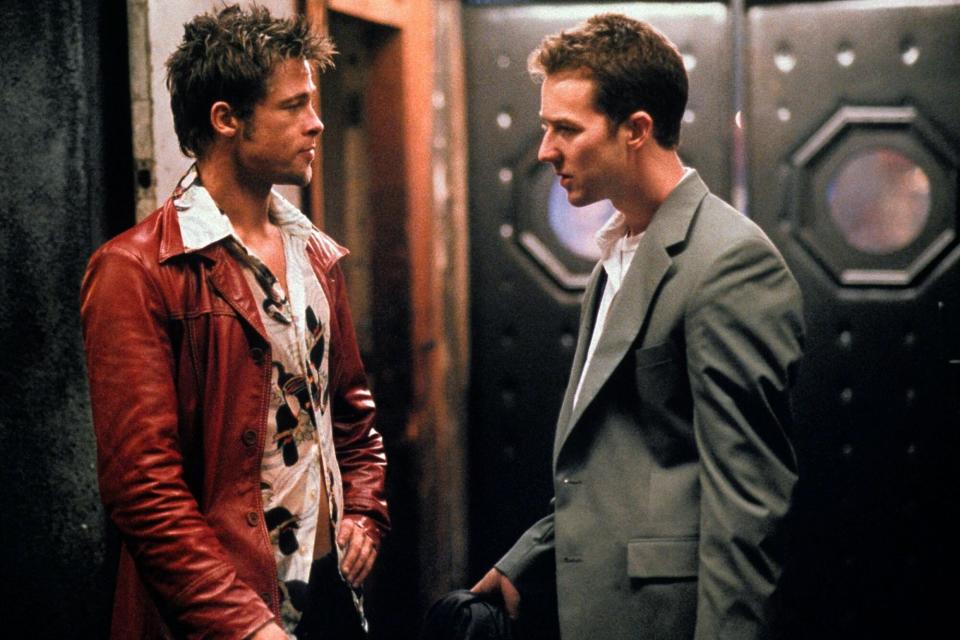
<i>Burn After Reading</i> (2008)
No stranger to outrageous ensemble casts, Pitt's performance in the 2008 Coen brothers dark-comedy-thriller, Burn After Reading, stands out even while he's amongst a bevy of fellow Hollywood heavyweights including George Clooney, Frances McDormand, Tilda Swinton, John Malkovich, JK Simmons, and Richard Jenkins. Pitt plays Chad Feldheimer, a gum-chewing, frosted-tipped personal trainer who navigates the world with a sense of childlike wonder that exists in complete dichotomy with the plot of the film. After discovering a compact disc with allegedly leaked CIA documents, Pitt and McDormand's characters thrust themselves into a world of love affairs, murder, and utter confusion.
Despite the high stakes and casual violence of the film, Pitt's character remains giddy as he frollicks, dances, and snaps. He fist bumps on the treadmill and casually drinks orange juice while extorting a federal agent by phone. Feldheimer finds himself more concerned with the safety of his bicycle than the litany of felonies he is casually committing, all the while surprised when things go awry.
Take, for example, when Feldheimer tries to shake down agent Osborne Cox (Malkovich), who instead delivers the former a swift punch to the face. Feldheimer recoils in confusion and pain, bewildered as to why he deserved such a blow. Burn After Reading delivers Brad Pitt in rare form: a bumbling idiot who loves berry blast smoothies and sports an iPod strapped to his arm. Both the film and his character are fantastic timepieces of the late-aughts.
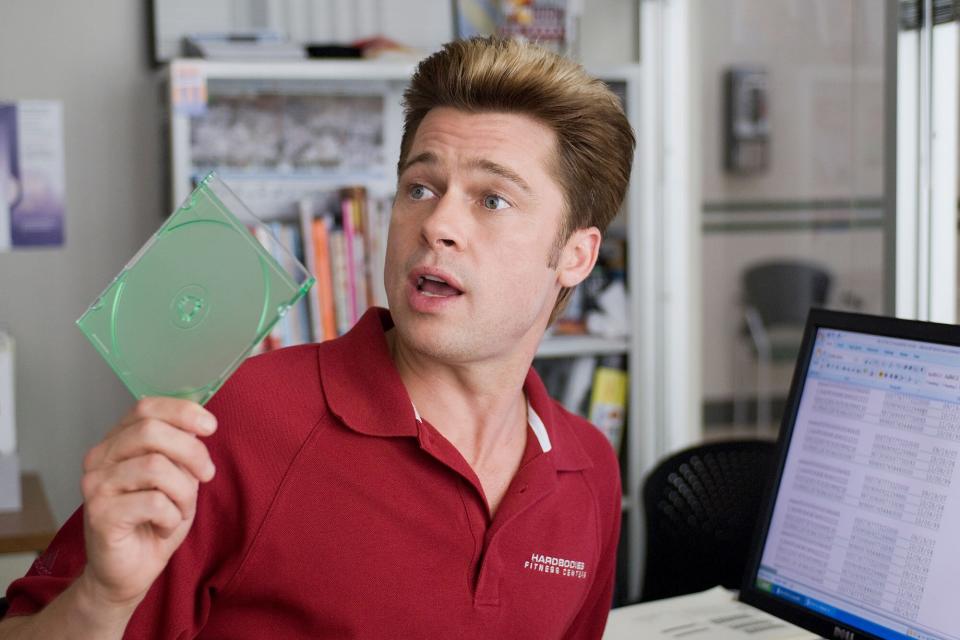
<i>Inglourious Basterds</i> (2009)
In Quentin Tarantino's sprawling World War II-era fantasy film, Inglourious Basterds, Pitt leads an elite crew of Jewish-American soldiers through German-occupied France with one clear mission: to kill Nazis. Playing Lieutenant Aldo Raine, an ex-moonshiner from Maynardville, Tennessee, the no-nonsense leader tells his squad that they should each deliver him 100 Nazi scalps or die trying. Raine, a man of the Great Smoky Mountains, goes by the nickname of "Aldo the Apache." But he's not the only soldier whose name precedes him. Take for example, Sergeant Donny Donowitz, aka "The Bear Jew" (Eli Roth), who fancies taking a baseball bat to the fascist opposition.
Pitt's character doesn't mince words. He has a clear distaste for the Third Reich, often smack-talking their troopers' affinity for sauerkraut and schnitzel before carving a Swastika into their foreheads. Raine can have tact, like negotiating his team out of a dangerous basement, or use subtle brute force by sticking his finger into a fresh bullet wound in order to navigate difficult situations appropriately. Perhaps the most entertaining image of Lt. Raine is in the film's final chapter, when the all-American boy cleans up in a white tuxedo and fails miserably at presenting himself as stuntman Enzo Gorlomi — brashly tossing out Italian fragments in his Tennessee drawl.
Inglourious Basterds earned eight Academy Awards nominations, with Christoph Waltz taking home Best Actor in a Supporting Role honors for his role as SS Colonel Hans Landa.
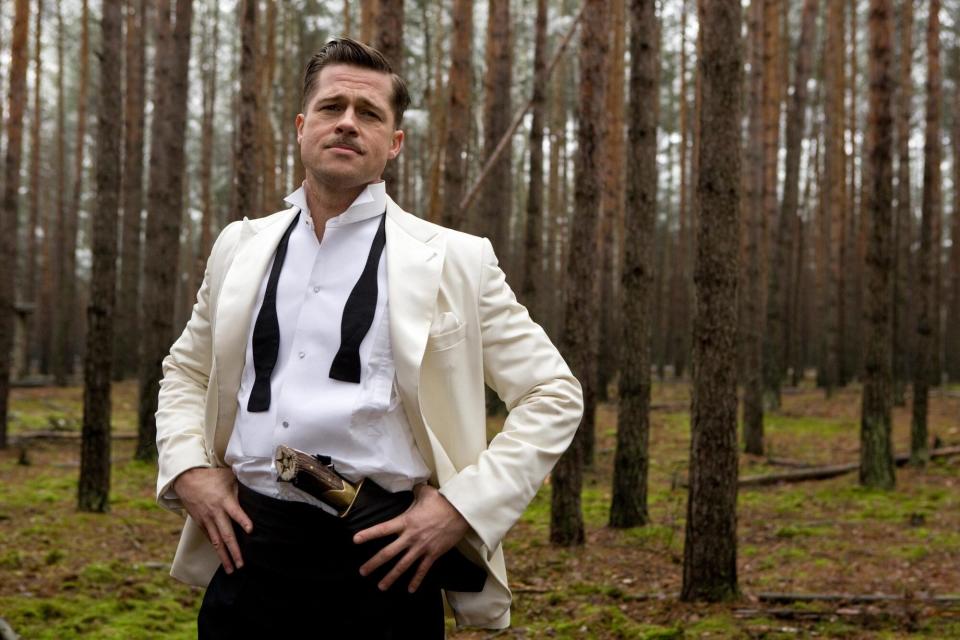
<i>Interview With the Vampire</i> (1994)
"I'm flesh and blood, but not human. I haven't been human for 200 years," explains Pitt's character, Louis, at the onset of the 1994 Neil Jordan-directed film Interview With the Vampire. Complete with a ponytail, fancy suit, and pale face, Pitt's character details his life as a man — and vampire — to a curious journalist (Christian Slater). Based on Anne Rice's novel, Interview was arguably the film that helped propel Pitt into superstardom.
Told in retrospect through flashbacks from the current day to the 1700s, the film details Louis' story of a man who lost his infant and wife during childbirth. Wallowing in his depression and hoping for a "release from the pain of living," Pitt's character is attacked by Tom Cruise's Lestat, a Parisian vampire transplant. After being left for dead on the banks of the Mississippi River, Louis later submits to Lestat's offer to live "free from sickness and death" as a vampire by drinking the latter's blood straight from his wrist.
Louis recounts centuries of life as a vampire, including trips to New Orleans so the duo could dine on French cuisine, as Cruise's character Lestat exhibits truly creepy behavior, like biting a woman's breast during a sexual encounter. Eventually, the vampires convert a young girl named Claudia (Kirsten Dunst) to join their bloodsucking family. Despite it being Dunst's first major role, her performance earned her a Golden Globe nomination. As the film unfolds, a strange father-daughter relationship develops between Louis and Claudia.
Ultimately, Louis is portrayed as a broken man whose regret is the only semblance of humanity he retains. A vampire who chronically lamented the idea of killing innocent victims to feed and sustain his own life, he's described as an "immortal with a mortal's passion." If the absurd layers of this film aren't enough to pique interest, any film that includes Brad Pitt slicing flying, flaming vampires with a massive scythe is worth a watch. Interview isn't a masterpiece, but the ridiculousness that it even exists necessitates a viewing.
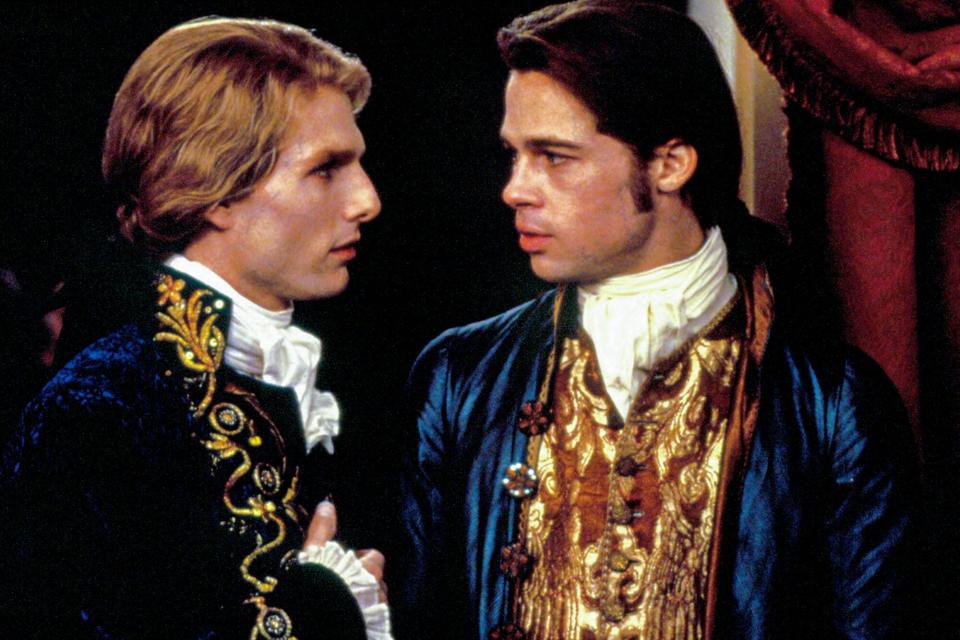
<i>Meet Joe Black</i> (1998)
Contrary to the mixed critical fanfare and harsh criticism of its three-hour-plus runtime, the 1998 film Meet Joe Black holds up with a charm that's subtle, refreshing, and thought-provoking. Perhaps viewers could credit their fatigue of aggressive editing and bombastic CGI — and the embrace of binge-watching countless hours of dramas on streaming services — but Meet Joe Black is palatable and digestible, which is a tall order considering it's almost exclusively driven by dialogue.
Oh, and by the way, Brad Pitt is playing death. Correct, Pitt, who plays the character operating under the pseudonym of "Joe Black," is actually quickly revealed as the human embodiment of death, temporarily perusing Earth as he prepares to take media mogul William Parrish (Anthony Hopkins) to the other side. A devilishly handsome grim reaper, Pitt first takes screen as a different identity: a quick-witted young professional who enchants Susan (Claire Forlani) — who happens to be the mogul's daughter— in a diner before they bid farewell. It's not long before a tragic accident replaces the lawyer's soul with the spirit of death. A confusing love story falls into place, but intertwines with the burning questions we all have: What's the point of it all? When will we expire? What will our legacy be? And is the passion of love worth the heartache of loss?
Pitt's performance is dramatic but is complemented by a disarming levity. New to the human form, death becomes obsessed with peanut butter. He marvels at the wheels on an office chair and speaks with no filter. It has some unexpectedly hilarious moments, but in short, Meet Joe Black is a great film because it's about mortality. It's about the fleeting nature of time, the desire to live life as long as possible when its sanctity is threatened and the uncomfortable resolution that some — such as the terminally ill or the accomplished and resolute — may be ready to leave it behind.
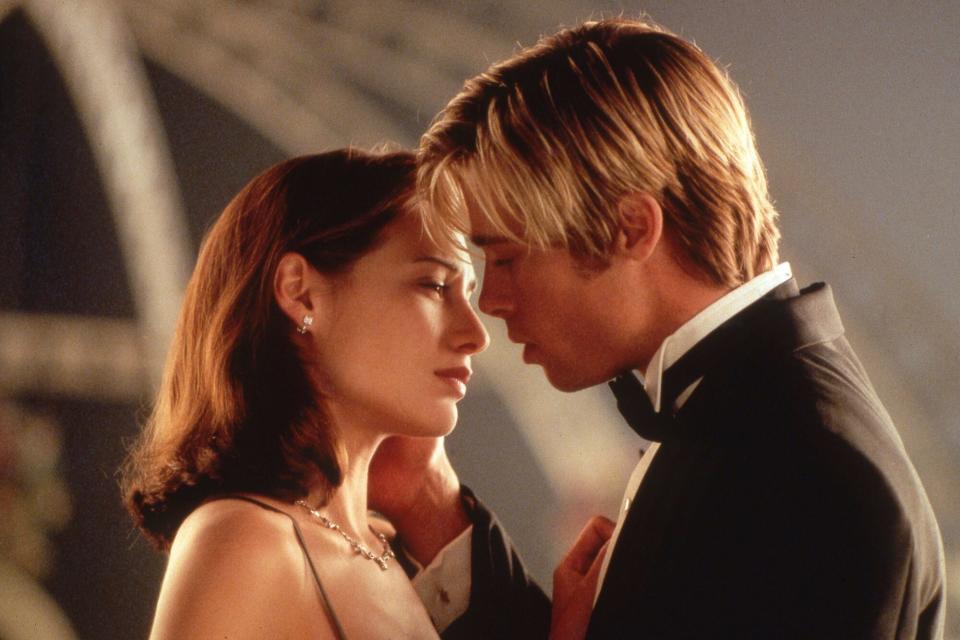
<i>Moneyball</i> (2011)
Few expected Brad Pitt and Jonah Hill to deliver a film as moving and dramatic as 2011's Moneyball. Based on Michael Lewis' best-selling book that provides an account of the Oakland Athletics' 2002 season, the film details the strategy implored by the team's general manager Billy Beane (Pitt) and assistant GM Peter Brand (Hill) to redevelop the way a Major League Baseball team is constructed both financially and philosophically.
With support from the late, great Phillip Seymour Hoffman, Chris Pratt, and more, Moneyball transcends the typical triumphant underdog sports film. By investing in character development and strategy developed off the diamond, the film embraces the stoic, reserved nature of Pitt's character. Beane took pride in embracing new, pragmatic ways of thinking in a room full of naysayers and traditional baseball purists. "We've got to think differently," Beane insisted as he knocked at a table surrounded by lifelong scouts.
In Pitt's performance, his calm in the face of enormous risk spoke louder than a ferocious loudmouth ever could. Beane and Brand systematically built a game-winning team off of statistics and budget, rather than investing the entire franchise's finances into players who were flashy, self-centered, or individually successful. As Beane explains to his team, the two acted as card counters who were ready to get back at the casino — or teams with astronomical budgets and starpower. And perhaps the funnest quirks of Pitt's character, he didn't ever watch the games. Moneyball isn't just a sports movie, it's a great movie. It was nominated for six Oscars, including Best Picture, Best Actor, and Best Actor in a Supporting Role.

<i>Once Upon A Time in Hollywood</i> (2019)
Quentin Tarantino's ninth film transports audiences back to late '60s Los Angeles, where fading Western star Rick Dalton (Leonardo DiCaprio) is struggling to find his way forward in an ever-changing landscape — boozing it up in the process. His stunt double, Cliff Booth (Pitt), meanwhile, is the calm, collected, classic car-driving, Hawaiian shirt-donning everyman who has no issue climbing up on the roof to get his hands dirty. And his performance was much-appreciated, as Pitt took home his (long overdue) first Oscar for Best Actor in a Supporting Role. The film also took home an Academy Award for production design, and in total was nominated in 10 categories.
Once Upon A Time in Hollywood stimulates the audience in the way only a Tarantino film can. When Pitt first meets Al Pacino's character in the famous Musso & Frank Grill on Hollywood Boulevard, he's sitting at the bar in a denim jacket, crunching on a stalk of celery and twirling it through his Bloody Mary, smiling and cool as a cucumber. That's a pretty good metaphor for Cliff Booth, who is equal parts suave and badass. Pitt also crosses paths with a stunt coordinator played by Kurt Russell (with a nice nod to Tarantino's Death Proof) and somehow ends up fist-fighting Bruce Lee on a studio lot. Then there's the storyline featuring Sharon Tate (Margot Robbie) and Charles Manson — and Pitt's tense visit to the Manson family ranch. Of course, the three-hour flick includes a good old-fashioned brawl and beatdown delivered by Pitt himself — and Leo has more than one opportunity to wield a flamethrower.

<i>Se7en</i> (1995)
Like Fight Club, Se7en is also directed by David Fincher and widely regarded as one of the most intense roles of Pitt's career. As the story goes, a week outside of retirement, Detective Somerset (Morgan Freeman) is ready to step away from police work. As he's showing young Detective Mills (Pitt) the ropes as he prepares to escape the chaos, he's given a unique case as a parting gift: a serial murderer is utilizing the seven deadly sins as a theme in his killings. The murders in the film represent the seven deadly sins as defined by Christianity: gluttony, greed, sloth, lust, pride, envy, and wrath.
The slayings are particularly grisly and not for the faint of heart (though they're always shown after-the-fact). Take for example, the first victim portrays gluttony: an obese man is force-fed literally to death via hermorrhage. It's a twisted film that's somewhat reminiscent of what horror films like Saw would later try to evoke by doubling down on the killer's perceived sense of justice for his crimes.
Pitt's performance is powerful in Se7en, notably crescendoing in the film's final act, when the killer John Doe (Kevin Spacey) leads the detectives into the desert. They locate a cardboard box with nefarious content, resulting in Pitt's famed scream, "What's in the box!?!?"
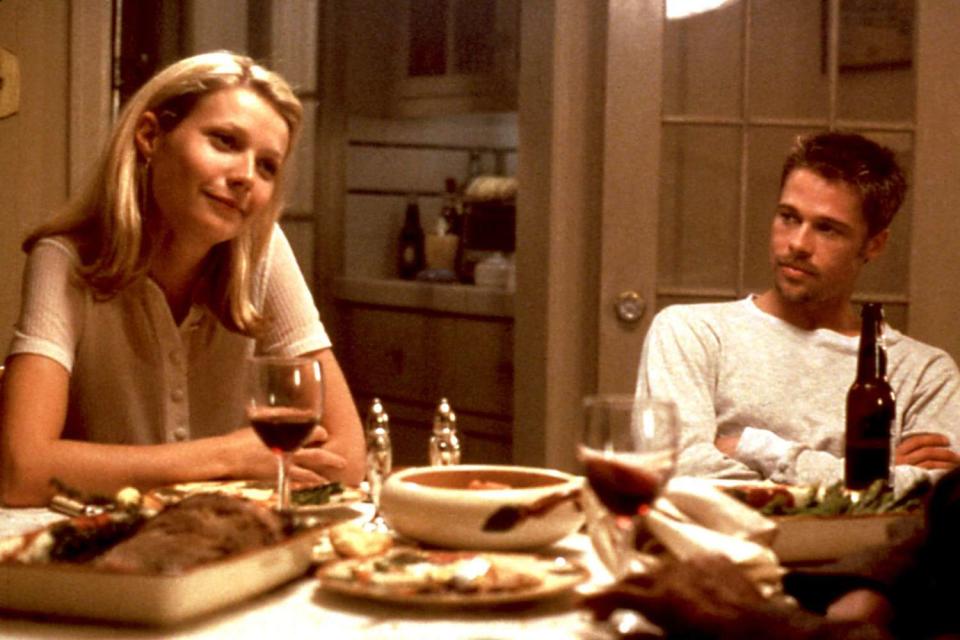
<i>Snatch</i> (2000)
The 2000 Guy Ritchie film Snatch places Pitt amongst a cavalcade of gangsters, thieves, and hooligans played by an all-star cast including Jason Statham, Stephen Graham, Lennie James, Benicio Del Toro, and Dennis Farina. Taking place in the rough-and-tumble world of British organized crime, gambling, and underground boxing, a grifter named Mickey O'Neil (Pitt) finds himself at the center of the blowback from an 84-karat diamond heist, a series of failed fight setups, and murder by arson.
A cheeky troublemaker with the gift of (somewhat incomprehensible) gab, O'Neil's tattooed torso and penchant for gold jewelry perfectly complement his physique: that of a bare-knuckle boxing champion. Mickey demonstrates quickly that he's more than just aesthetic, as he tosses enormous man through a wooden gate in an exhibition of raw power. Complete with a leather fedora, mustache, and cigarette hanging from his mouth, O'Neil is ready to swindle you for whatever you're worth — making him a thorn in the side of boxing promoters and lowkey criminals Turkish (Statham) and Tommy (Graham).
A brutish warrior who loves his mother dearly, Pitt's character is focused on providing for his family and seeking vengeance when harm is done in his own backyard. The crime-comedy plotlines interact and come to a close in the most serendipitous of ways, almost as if you were to combine a Coen brothers movie with an episode of Curb Your Enthusiasm.
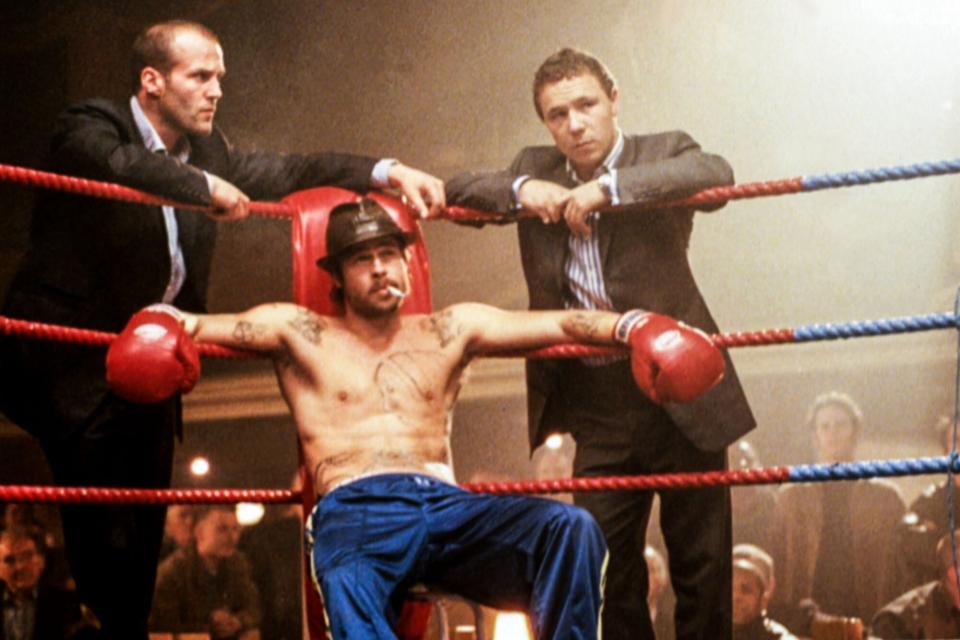
<i>The Curious Case of Benjamin Button</i> (2008)
Perhaps the most peculiar character in Brad Pitt's filmography is his title role in The Curious Case of Benjamin Button, yet another David Fincher film. Loosely based on a short story written by The Great Gatsby author F. Scott Fitzgerald, the movie was nominated for 13 Academy Awards and took home three Oscars: for makeup, art direction, and visual effects.
Alongside a terrific cast including Cate Blanchett, Taraji P. Henson, Mahershala Ali, and Tilda Swinton, the film tells the story of Button, who is born with the appearance and strength of an elderly man and ultimately ages backwards into infancy. While the story is book-ended by scenes in New Orleans at the onset of Hurricane Katrina (2005), Button's life journey begins in 1918. Over the years, he navigates his bizarre condition, historical milestones, and romance with his childhood friend and lifelong partner, Daisy (Blanchett).
Pitt's performance in the movie, coupled with CGI and makeup, makes for a role with a variety of sub-characters built in. Not only did he perform as the same person at different ages, but at each of those ages he was inversely represented physically. The precision and focus to pull off such a premise cannot be overstated.
Aside from the technical acting precision of Pitt, The Curious Case of Benjamin Button is a masterful film because of the universal sentiments it provokes — even through the purview of a character whose life experience is unique and unrelatable. The movie's most fundamental yings and yangs are abundant: life's highs and lows, births and deaths, and successes and failures are all demonstrated through Button's unusual path and the characters he's met along the way. It's a tragic yet heartwarming reminder to spend time with those you care for and be present all the while.

Related content:

